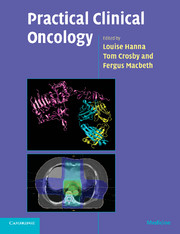Book contents
- Frontmatter
- Contents
- List of contributors
- Preface
- Acknowledgements
- Abbreviations
- 1 Practical issues in cytotoxic chemotherapy usage
- 2 Biological treatments in cancer
- 3 Hormones in cancer
- 4 Radiotherapy planning
- 5 Research in cancer
- 6 Oncological emergencies
- 7 Palliative care
- 8 Head and neck
- 9 Oesophagus
- 10 Stomach
- 11 Liver, gallbladder and biliary tract
- 12 Exocrine pancreas
- 13 Colon and rectum
- 14 Anus
- 15 Gastrointestinal stromal tumours
- 16 Breast
- 17 Kidney
- 18 Bladder
- 19 Prostate
- 20 Testis
- 21 Penis
- 22 Ovary
- 23 Body of the uterus
- 24 Cervix
- 25 Vagina
- 26 Vulva
- 27 Gestational trophoblast tumours
- 28 Lung
- 29 Mesothelioma
- 30 Soft tissue and bone tumours in adults
- 31 The lymphomas and myeloma
- 32 Central nervous system
- 33 Skin cancer other than melanoma
- 34 Melanoma
- 35 Thyroid
- 36 Neuroendocrine tumours
- 37 Cancer in children
- 38 Cancer of unknown primary
- 39 The use of radiotherapy in the treatment of benign conditions
- Multiple choice questions
- Multiple choice answers
- Index
- References
2 - Biological treatments in cancer
Published online by Cambridge University Press: 23 December 2009
- Frontmatter
- Contents
- List of contributors
- Preface
- Acknowledgements
- Abbreviations
- 1 Practical issues in cytotoxic chemotherapy usage
- 2 Biological treatments in cancer
- 3 Hormones in cancer
- 4 Radiotherapy planning
- 5 Research in cancer
- 6 Oncological emergencies
- 7 Palliative care
- 8 Head and neck
- 9 Oesophagus
- 10 Stomach
- 11 Liver, gallbladder and biliary tract
- 12 Exocrine pancreas
- 13 Colon and rectum
- 14 Anus
- 15 Gastrointestinal stromal tumours
- 16 Breast
- 17 Kidney
- 18 Bladder
- 19 Prostate
- 20 Testis
- 21 Penis
- 22 Ovary
- 23 Body of the uterus
- 24 Cervix
- 25 Vagina
- 26 Vulva
- 27 Gestational trophoblast tumours
- 28 Lung
- 29 Mesothelioma
- 30 Soft tissue and bone tumours in adults
- 31 The lymphomas and myeloma
- 32 Central nervous system
- 33 Skin cancer other than melanoma
- 34 Melanoma
- 35 Thyroid
- 36 Neuroendocrine tumours
- 37 Cancer in children
- 38 Cancer of unknown primary
- 39 The use of radiotherapy in the treatment of benign conditions
- Multiple choice questions
- Multiple choice answers
- Index
- References
Summary
Introduction
Biological agents are becoming increasingly important in the management of cancer patients. For patients with some tumours – such as renal cancer, where chemotherapy is not very effective – biological agents are the main treatment after surgery. In other solid tumours, although chemotherapy has improved survival rates it has been at the expense of more toxicity. Increasing evidence supports the use of biological agents both as single agents and in combination with chemotherapy. Over the next decade, it is likely that biological therapies will significantly change the management of cancer patients. Because this is a rapidly changing field, the licensed indications for new drugs is also changing; a useful resource for up-to-date information on licensed drugs can be found in the electronic Medicines Compendium (www.medicines.org.uk/).
This chapter will concentrate on five areas:
Cytokines.
Tyrosine kinase inhibitors.
Monoclonal antibodies.
Haemopoietic colony stimulating factors.
Vaccines.
Cytokines
Cytokines are proteins that are secreted by haemopoietic and non-haemopoietic cells and which play an important role in the immune system. They work by binding to specific effector-cell surface receptors, thereby initiating a number of intracellular signalling cascades that change the functioning of the effector cell. This group of molecules is complex and increasing in number, and there are several different classification systems that have been used, based on the molecules' presumed function, their cell of secretion, their target of action or their structure.
- Type
- Chapter
- Information
- Practical Clinical Oncology , pp. 13 - 22Publisher: Cambridge University PressPrint publication year: 2008



